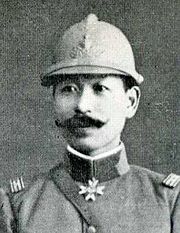- Nobutaka Shiōden
-
Nobutaka Shiōden 
General Nobutaka ShiōdenBorn September 2, 1878
Saitama prefecture, JapanDied August 8, 1962 (aged 83) Allegiance Empire of Japan Service/branch  Imperial Japanese Army
Imperial Japanese ArmyRank Lieutenant General In this Japanese name, the family name is " Shiōden ".Nobutaka Shiōden (四王天 延孝 Shiōden Nobutaka, 2 September 1878 – 8 August 1962) was a lieutenant general in the Imperial Japanese Army, legislator in the Diet of Japan, and propagandist of a Jewish conspiracy theory during and after World War II.
Contents
Biography
A native of Saitama Prefecture, Shiōden was a graduate of the 11th class of the Imperial Japanese Army Academy in November 1899, and was commissioned as a second lieutenant in the Imperial Guard of Japan. He served in various postings with the Imperial Guard, including some time with the Japanese garrison force in China, and also served in a number of administrative and staff positions within the Imperial Japanese Army General Staff. He graduated from the Army Staff College in 1909.
During World War I, from 1914-1918 Shiōden was sent to France as a military attaché and official Japanese military observer. While in Paris, he was exposed to the common theory that an international Jewish conspiracy was behind the war, thereafter he began to research into issues related to Freemasonry, and the so-called “Jewish-problem”, as a result of which he became a fervent anti-Semite and leading voice of anti-Semitic propaganda in Japan.[1]
In 1920, Shiōden was assigned to the Harbin special operations office within the Kwantung Army. Harbin was home to a large population of Russians, including many Jews. A strong supporter of military aviation from his first-hand experiences in World War I, Shiōden returned to Japan in 1922 to assume command of the Army Aviation School. He later served on the Military Aviation Bureau within the General Staff.
In 1924, Shiōden was promoted to major general.
In 1936, Shiōden translated "The Protocols of the Learned Elders of Zion" into Japanese.[2] In 1928, he served on the staff of the IJA 16th Division and IJA 3rd Division. He was promoted to lieutenant general in 1929, and entered the reserves the same year. He subsequently served in the largely honorary post as Chairman of the Imperial Aviation Association, which promoted the development of Japanese military aviation and ran donation campaigns for the funding of new aircraft. From 1942-1945, he served as a member of the House of Peers in the Diet of Japan.
After the surrender of Japan, Shiōden was arrested by the American occupation authorities, but was not prosecuted for any war crimes and was released in 1947.
See also
References
- Goodman, David G.; Masanori Miyazawa (1995). Jews in the Japanese Mind: the History and Uses of a Cultural Stereotype. New York: The Free Press. ISBN 0-02-912482-4.
- Renolds, E. Bruce (2004). Japan in the Fascist Era. Palgrave Macmillan. ISBN 140396338X.
Notes
Categories:- 1878 births
- 1962 deaths
- People from Saitama Prefecture
- Japanese generals
- Propagandists
- Members of the House of Peers (Japan)
Wikimedia Foundation. 2010.
